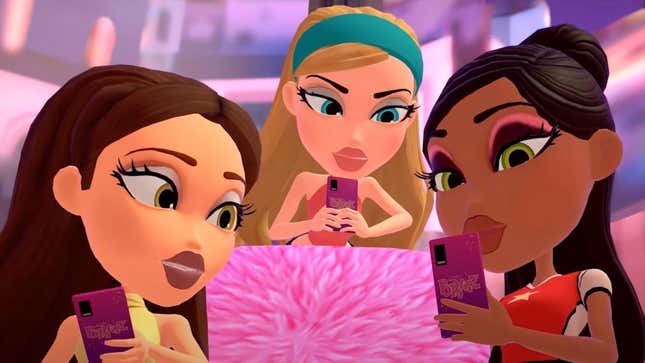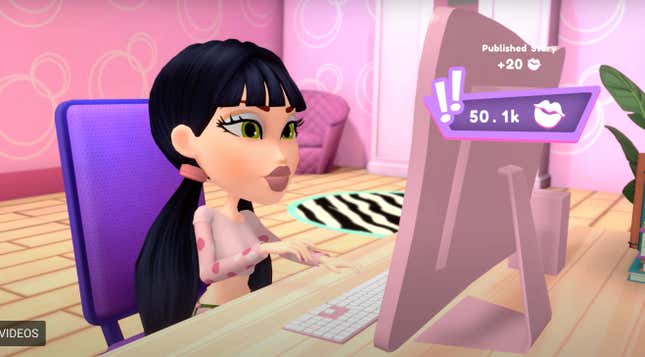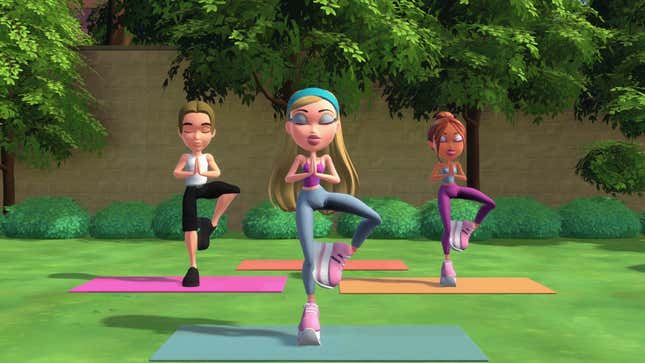
When I got an email that Bratz: Flaunt Your Fashion, the first official Bratz dolls video game since 2012, was coming out in November across most platforms, including, remarkably, the PS5, I was intrigued and a little amused. When I booted it up, I got that familiar hit of nostalgia, as each of the four main characters—Sasha, Yasmin, Jade, and Cloe—looked exactly as plastic-smooth as I remembered their dolls being in 2001. They were even dressed in simpler versions of the outfits the debut set wore that year (I had the original Cloe, and often chewed on her hands). I was three then, and I tend to romanticize my favorite childhood things, but after playing Flaunt Your Fashion (stylized as Flaunt your fashion), I’m ready to move on.
I didn’t necessarily want to be. With my bonbon-sized baby brain, I used to see something I needed in Bratz dolls’ characteristic tennis-ball-sized heads: flirty, jet-black eyelashes, plump lips, red like two strawberries, all in a range of skin tones and indeterminate ethnic features that other, more Anglo-Saxon dolls couldn’t offer me as a mixed-race kid. To me, Bratz dolls showed me the global femininity I should aspire to, a portal to my future. Or I recognized the Bratz girls as “Little Hotties,” as a 2006 New Yorker article puts it.
But the game is, to put it succinctly, not good. It’s a three-ish hour adventure you play as one of the four Bratz girls, completing minigames and low-stakes missions for your very own Bratz Magazine, where you gain thousands of subscribers every time you post. Your objectives are always clear-cut and stereotypically feminine: do yoga in the park, take a good selfie, buy new clothes and makeup so that you can take a good selfie and rack up extra subscribers. To make each objective more mind-numbing, you can never lose, even when you’re as bad at working the game’s clunky minigames (walk in a fashion show, play in a rock band) and quicktime events (the selfies, again) as I was.

My ability to enjoy Flaunt Your Fashion was certainly limited because I am, regrettably, no longer three years old, but more gender neutral and male-centered children’s titles like Pokémon and Super Mario at least try to rouse my imagination, which has no age limit. It feels unfair that, even in 2022, video games marketed toward young girls are still so myopic in their focus, so one-note, unthinking, and unfeeling. You get to travel the world in Flaunt Your Fashion, but developers make sure that Barcelona, Seoul, New York, and Bratz hometown Stilesville all feature a shopping mall as their central location. It hurts—we get a taste of expansive video game reality with fast travel, and the Bratz girls live alone and support each other’s careers and interests as a taste of 2022 freedom. But everything they do sticks to typical gender roles like an annoying wad of gum. Ultimately, girls like cute clothes, right?
I hoped, at least, that a fashion game would occasionally be pretty or impressive, but I played on PC with a 3080 GPU on the game’s best available graphics setting, and still felt like I was trying to find meaning in pancake batter. There isn’t a strip of shadow or texture anywhere—every location is interchangeable and flat and pink. With not much to enjoy visually and the most inventive gameplay coming down to an occasional added form of transportation, like roller skates or a hoverboard you can rent, I don’t think there was any point in reviving a 10-year-old franchise with a $40 game about as intriguing as a cement mixer churning chunky glitter. It makes a point of keeping girls’ video games as unadventurous as they were 20 years ago in my childhood. So the whole point of Flaunt Your Fashion, I realize, is to cash in on the 2000’s nostalgia currently trapping my generation in amber.
“There are, of course, many ways to look backward,” University of Toronto professor Linda Hutcheon writes in her dialogue from 2000, “Irony, Nostalgia, and the Postmodern.” “You can look and reject. Or you can look and linger longingly.” We are at the top of the Y2K revival rollercoaster (though the 2010’s are praying for a turn), and so girls my age see Bratz dolls with Saint Laurent hearts in our eyes. We’re willing to suck in for Maroske Peech micro-mini skirts, or so that Poster Girl dresses can cling to our little bodies like the Little Hotties, their original slogan “the girls with a passion for fashion,” taught us to. We’ve already mastered their ambiguous, glossed faces for Instagram, as Jia Tolentino noted in 2019.

We’re turning ourselves into Bratz dolls because, for women, surfing a tidal wave of nostalgia wasn’t always possible. In her dialogue, Hutcheon references anthropologist Michael M. J. Fischer, who wrote in 1994 that feminism has “no tendency toward nostalgia, no illusion of a golden age in the past.” But that’s changed 20 years later—our special days started in the late 90’s and early 2000’s, when woman’s sexual agency and beauty was reframed from something for men to fear or take to something women could and should use as an emancipatory tool.
“This is about girl power,” Scary Spice says in the Spice Girls’ 1997 VHS One Hour of Girl Power, “this is not about picking up guys.”
Laura Mulvey descendants might argue the same, that new feminist nostalgia is not a reaction to men, but a version of the “female gaze”—which The Miseducation of Cameron Post director Ashley Connor describes as “a frame of mind, where approach to subject and material is more emotional and respectful.” But I don’t think the female gaze has a chance if it’s only ever made to stare at what traditional gender roles instruct us to desire, Victoria’s Secret bags and unconvincing pop stars.
While exercising our new nostalgia, I think we’ve gotten a little bit misguided. I don’t think every woman should disappear herself in a pillar of salt, or like a TreeChangeDoll, a popular doll rehab on Etsy where formerly glamorous Bratz go to lose their makeup and gain pigtails. There’s nothing wrong with beauty, and there’s nothing wrong with a woman who has her own sense of it. But girls deserve the chance to be interesting, not just given video games whose sole purpose seem to be pushing capitalism and a limited version of femininity as a false sense of empowerment. We’ve already turned ourselves into Bratz dolls—that form of nostalgia has nothing left to give. Next year, maybe, we can try again.